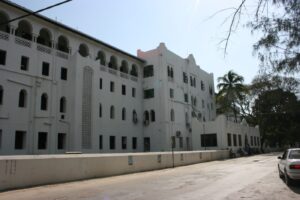Zanzibar — ZANZIBAR President Hussein Mwinyi has called upon parents in the country to adopt positive parenting that will enable children become patriotic and responsible citizen.
Dr Mwinyi said parents, teachers, caregivers and educational institutions have the big role to play in grooming children to become reliable people and the best foundations for the future of the country.
“As parents, teachers and adults in the community, we must take an active role in promoting good behaviours to reduce moral decay,” he said, adding that teaching children about religion has many advantages.
The President took the stance yesterday at the celebrations held at Masjid (mosque) Jaameh-Zenjibar to welcome New Year of 1446 on Islamic calendar.
The President noted that religious upbringing to kids also contributes towards a number of positive outcomes as well, such as them volunteering in the community and peace building.
The Islamic New Year begins today (July 8, 2024) and it is a public holiday in Zanzibar. Dr Mwinyi also urged scholars and clerics to use different forums during the holiday to educate people about the Muslims calendar so that they become familiar with it.
In a related development, he thanked the office of the Mufti for promoting the Muslim calendar, which contains much useful information on human beings.
“The new-year celebration should be supported by encouraging the believers to know and understand ‘Hijra’ (Migration or the journey the Islamic prophet Muhammad and his followers that took from Mecca to Medina). Muslims have a duty to follow the teachings in maintaining peace,” he said.
Based on religious teachings, Dr Mwinyi also asked public servants, employees in the private sector, the selfemployed and businessmen to increase their efforts to work hard and pay tax.
For his part, Minister of State in the President’s Office (Constitution, Legal Affairs, Public Service and Good Governance), Mr Haroun Ali Suleiman said members of the community have to obey and respect all serving leaders in the country as insisted in the Holy Books.
“We are taught to respect our elders and leaders, so it is not good for a Muslim to despise leaders elected to lead and guide us,” he said.
Mr Suleiman asked the Mufti Office administrators to continue promoting unity by organising such events, which bring people together and to learn, reflect about peace, love and unity in the country, which are important for development.
Executive Secretary of the Mufti’s Office Sheikh Khalid Ali Mfaume said since the beginning of the celebration of the Islamic New Year, last year, many achievements have been recorded including the increased awareness about the Muslims calendar.
He mentioned other achievements as promoting love and unity among Tanzanians and increase cooperation and hardworking.
Sheikh Mbarak Uwesu from Kenya who was one of the key preachers, said development and better life in the country cannot be achieved without peace, adding that all people including Muslims must promote peace and stability.
Source: allafrica.com














